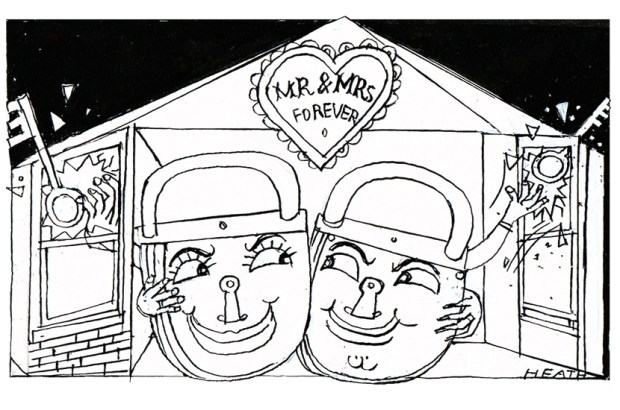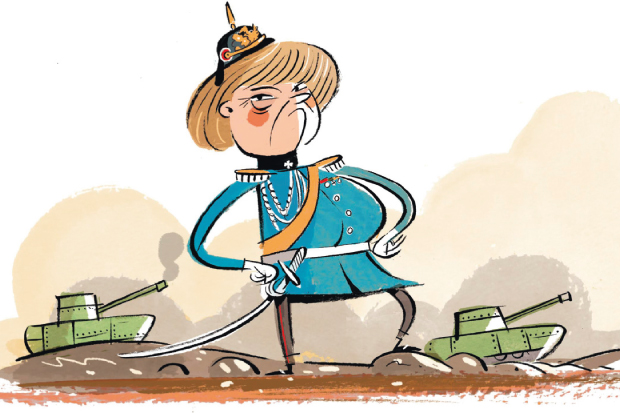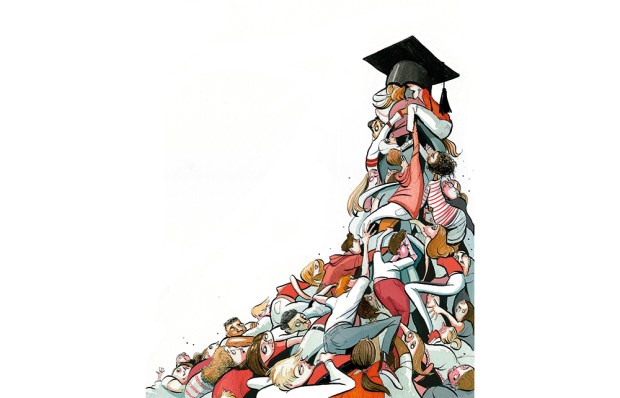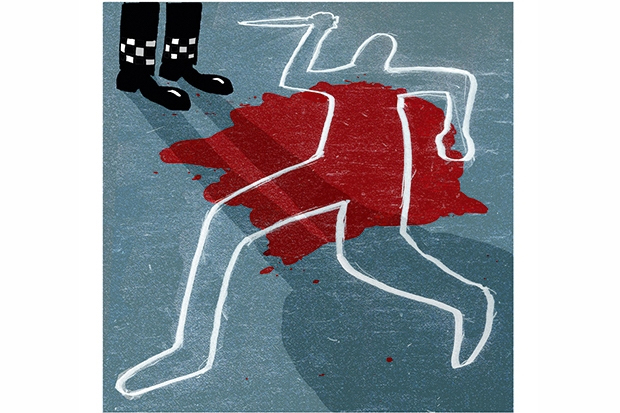An economic slowdown, the far right on the rise, even apocalyptic hailstorms – what on earth is happening in Germany? Is Europe’s industrial powerhouse on the slide? Well, yes and no. Germany is in recession, and Germany’santi-immigration party, Alternative für Deutschland (AfD), is growing stronger, but the bad news coming out of Germany indicates a more lasting sea change: liberal Britain has finally fallen out of love with the Bundesrepublik.
It’s not just British Teutonophiles who are troubled by the rise of AfD. This week Germany’s domestic spy chief, Thomas Haldenwang, warned about growing right-wing extremism within the party and German President Frank-Walter Steinmeier has echoed these concerns. ‘Ban the enemies of the constitution!’ declared Der Spiegel, Germany’s renowned news magazine. For the first time in a lifetime, Germany’s hard-won reputation for political moderation and economic savvy looks shaky.
Ever since the Berlin Wall came down in 1989 and West and East Germany were reunited, progressive Britons have cultivated an improbable affection for Europe’s most powerful and populous nation. Berlin became the capital of cool, and British centrists looked towards Germany as a paradigm of caring capitalism.
This infatuation reached its giddy peak in 2016, when Donald Trump became US president and the UK left the European Union. Compared with Trump’s wild pronouncements and the parliamentary chaos of BrexitBritain, Angela Merkel’s administration seemed like a paragon of common sense. You could see the attraction. As Trump let rip on Twitter, and Britain lurched from -Theresa May’s logjam to Boris Johnson’s rollercoaster ride, there were times when ‘Mutti’ Merkel looked like the only grown-up in the room.
Repentant Merkel fans are realising, belatedly, that appearances can be deceptive. When Vladimir Putin invaded Ukraine, it transpired that Trump’s intemperate complaints about German reliance on Russian fossil fuels had actually been bang on the money. Germany moved remarkably quickly to wean itself off Russian oil and gas, but the damage to Merkel’s record was done. Unlike Trump or Johnson, her serene aura of sagacity had always been her main asset. Stripped of her reputation for omniscience, her time in office now looks very different.
The rise of AfD is another awkward legacy of the Merkel era. Merkel’s party, the Christian Democratic Union (CDU) had always been more -Heathite than Thatcherite, but it was a conservative party nonetheless. However, during her 16 years as chancellor, Merkel gradually shifted it from the centre-right of German politics to the centre, appropriating the natural territory of Germany’s soft-left social democratic party, the SPD.
In the short term, this was highly effective, neutralising the SPD and leaving it nowhere to turn but further left, where it would be outflanked by Germany’s hard-left rump, Die Linke. In the longer term, however, Merkel’s centrism left an empty space on the right wing of German politics, which AfD has been quick to fill. For British progressives, who saw her as a bastion against right-wing populism, it’s a particularly problematic bequest.
Merkel’s successor as Chancellor, the SPD’s Olaf Scholz, is an effective backroom fixer with the underwhelming air of a boring middle-ranking bureaucrat. He will never have broad appeal in Britain. Perhaps that’s for the best. Without another ‘Mutti’ to pin their hopes on, maybe British liberals will acquire a more realistic attitude towards Germany, and realise the Bundesrepublik has never been their promised land.
As anyone who’s spent any time there will attest, Germany is a refreshingly old-fashioned and socially conservative country, especially in its extensive rural areas, dotted with sleepy villages and quaint market towns. British travellers, who usually gravitate to Berlin, or big cities like Hamburg and Cologne, come away with a distorted idea of German attitudes, much as foreign visitors to London receive a false impression of Britain.
Unlike London, the German capital exerts only a vague gravitational pull over Germany as a whole. The Bundesrepublik is a federation of 16 states and, as in the USA, state identity is as significant as national identity. For Germans, regional elections loom just as large as national elections. Their state capital is as important as their national capital (Bavarians never tire of telling you that Munich is closer to Milan than Berlin). Despite the seductive lure of the big cities, many Germans are stubbornly provincial, rooted to their hometowns, still getting their news from local newspapers and regional TV.
While Britain’s left-wing pundits have been inclined to regard Germany as a right-on nirvana, Britain’s right-wing commentators, conversely, can never quite decide whether Germany is a social and economic basket-case, bound for inevitable self-destruction, or an omnipotent superpower, determined to dominate Europe by stealth.
These two contradictory stereotypes are a long way from the truth. Over the past 30 years, reporting from all over Germany, I’ve found most Germans to be reassuringly traditional, intensely engaged in local politics but less interested in the wider world. They like to work hard, keep their heads down and enjoy their creature comforts. What most Germans really yearn for is a quiet, cosy life.
The old ‘ruthlessly efficient’ cliché is also way wide of the mark, as anyone who’s recently travelled on Germany’s national rail network, Deutsche Bahn, can confirm. For British journalists, Deutsche Bahn has become a prime example of Germany’s current woes, but in fact this is nothing new – Germans have been moaning about German trains, with good reason, for years.
So just how bad are things in Germany right now? Sure, the latest economic figures are pretty grim (even Robert Habeck, Germany’s impressive Vice Chancellor, described the current situation as ‘anything but satisfactory’), but look closer and the picture soon becomes more complex. Yes, German inflation is higher than the EU average, but it’s lower than in Britain. Yes, the economy is contracting, but factory orders are at a three-year high.
Likewise, although AfD is on the rise, recently winning its first district council election, its vote share in the last national election shrank by nearly a fifth, from 12.6 per cent in 2017 to 10.3 per cent in 2021. It’s polling more than 20 per cent (ahead of the SPD), but its popularity is already pulling Germany’s main opposition party, the CDU, back towards the right, and that’s surely no bad thing. If the CDU becomes a proper centre-right party again, how many votes will AfD get? Not enough to break through is my guess.
What do Germans think about it all? That’s rather hard to tell. On hundreds of journalistic assignments, stretching right back to reunification, virtually every German I’ve met has seemed incurably downbeat about its prospects, whatever the current state of affairs. Doom and gloom is their default setting. They invariably fear the worst. Inevitably, they even have a compound noun for it: Weltschmerz (literally ‘world pain’).
As a joint Anglo-German citizen based in Britain, a frequent visitor to Germany without the burden of actually living there, I can’t say I share the negativity of my German friends and relatives. Unlike them, my Bierkrug is half full, rather than half empty. The elephantine German economy will lumber on from crisis to crisis, as it always does, and the CDU will lean right and re-enter government at the next election. Even those pesky hailstorms will disperse.
Meanwhile, here in Britain, this latest bout of bad news from the Bundesrepublik has been a necessary corrective – a reminder that Germany is just another modern industrial nation a lot like the UK, with similar headaches and aspirations (including a desire to control immigration). Germany is still much the same, thank goodness. It’s our view of it that’s changed.
Got something to add? Join the discussion and comment below.
Get 10 issues for just $10
Subscribe to The Spectator Australia today for the next 10 magazine issues, plus full online access, for just $10.
You might disagree with half of it, but you’ll enjoy reading all of it. Try your first month for free, then just $2 a week for the remainder of your first year.














Comments
Don't miss out
Join the conversation with other Spectator Australia readers. Subscribe to leave a comment.
SUBSCRIBEAlready a subscriber? Log in